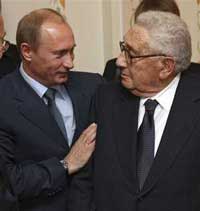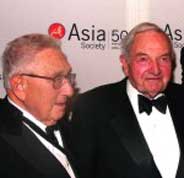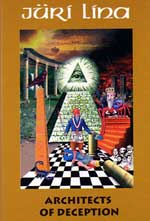The Case of Kissinger
Jüri Lina | Excerpt from the book
2,274 views
Architects of Deception: The Concealed History of Freemasonry
Heinz Alfred Kissinger was born on 27 May 1923 in Furth in central Germany, the son of a rabbi (Washington Observer,
15 April 1971). His parents emigrated to the United States in 1938 and
Heinz became Henry. From 1943 to 1945 he worked for US intelligence.
Later he taught political science at Harvard University. Kissinger
himself was educated by Professor William Yandel Elliott, who adhered to
H. G. Well’s crazy ideas.Architects of Deception: The Concealed History of Freemasonry
In 1955, he developed a relationship with Nelson Rockefeller (Frank Capell, Henry Kissinger: Soviet Agent. Cincinnati, 1992, p. 29). The poor Jewish refugee became a powerful figure thanks to the Rockefeller family that began using him as a proxy. In 1956, he was named editor of the influential magazine Foreign Affairs.
Henry Kissinger is a high-ranking official of the Jewish masonic organization B’nai B’rith. He is also a member of the Bilderberg group and the Trilateral Commission. He belongs to the Swiss Grand Lodge Alpina, the elitist Bohemian Club, and he is a member of Phi Beta Cappa Club, Cosmos Club, Federal City Club, and Century Club.
Kissinger was an adviser to presidents Richard Nixon and George Bush Sr. In the years 1961, 1969 and 1973 he passed the internal security check. The information on him was given by the State Department not by the FBI. In the beginning of his career as Nixon’s adviser, he gained control of the intelligence services in the United States (Frank Capell, Henry Kissinger: Soviet Agent. Cincinnati, 1992, p. 9).
 In
April 1946, Kissinger started teaching at a school for intelligence
agents. During this period he was recruited as a Soviet agent by the
KGB, under the codename Bor (Gary Allen, Kissinger: The Secret Side of the Secretary of State. Seal Beach, California, 1976, p. 18).
In
April 1946, Kissinger started teaching at a school for intelligence
agents. During this period he was recruited as a Soviet agent by the
KGB, under the codename Bor (Gary Allen, Kissinger: The Secret Side of the Secretary of State. Seal Beach, California, 1976, p. 18).Kissinger was the architect behind the Christmas bombings of Hanoi and Hai-Phong in 1972. He became secretary of state under President Gerald Ford in 1973. According to Wall Street Journal, Kissinger helped Peter Wallenberg in Sweden illegally to export high technology to the communist Eastern Europe.
Outwardly Kissinger was a liberal. Liberalism is, however, basically a leftist ideology. The Salt Lake City Deseret News reported on 27 March 1970 that behind the designation of Kissinger as national security adviser to President Nixon was Nelson Rockefeller.
 It was Henry Kissinger who toppled Richard Nixon by using the Watergate Affair (Gary Allen, The Rockefeller File. Seal Beach, California, 1976, p. 176).
It was Henry Kissinger who toppled Richard Nixon by using the Watergate Affair (Gary Allen, The Rockefeller File. Seal Beach, California, 1976, p. 176).Kissinger received the Nobel Peace Prize in 1973 for having the communists win the Vietnam War.
It was Henry Kissinger who was behind the oil crisis of 1973-1974, and he pushed through his plans at a secret meeting in Stockholm, Sheik Yamani, a former minister for oil of Saudi Arabia revealed in The Observer on 14 January 2001. Kissinger organized a quadrupling of the oil price in November 1973. The meeting Sheik Yamani referred to was the Bilderberg convention in the vicinity of Stockholm in May 1973. This was confirmed in William Engdahl’s book A Century of War: Anglo-American Oil Politics and the New World Order (1993).
In the early 1960s, however, a serious drawback occurred that he had not counted with. A defected communist agent exposed Kissinger as a Soviet spy, codename Bor.
Colonel Michal Goleniewski of the Polish intelligence service had sent a letter under the alias Sniper in March 1959 to the United , States ambassador to Switzerland, and revealed secret information leading to the arrest of SIS officers George Blake and Gordon Lonsdale in England. Both were tried and sentenced as Soviet agents. During Christmas of 1960 Sniper himself defected. He was a relatively high-ranking KGB officer, who exposed many Soviet agents in Great Britain. The information was verified and the spies were arrested. A little later Goleniewski turned over a list of Soviet agents in Sweden, which Swedish intelligence could verify. The Swedish socialist government, however, did not allow the arrest of any Soviet agents, except for one dangerous traitor, called Stig Wennerstrom.
 Next
in turn were West Germany, Denmark, and France. Again all the
information turned out to be correct and Soviet agents were caught. A
total of 5000 pages of top-secret material were delivered by
Goleniewski, plus 800 pages of Soviet intelligence reports and 160
microfilms. All information was correct.
Next
in turn were West Germany, Denmark, and France. Again all the
information turned out to be correct and Soviet agents were caught. A
total of 5000 pages of top-secret material were delivered by
Goleniewski, plus 800 pages of Soviet intelligence reports and 160
microfilms. All information was correct.On 12 January 1961, Goleniewski arrived in the United States. He had extremely important information about a spy at high level and demanded to see President Kennedy, which was denied. Instead he saw the head of the CIA and revealed who the secret Soviet agent was — Harvard professor and national security adviser Henry Kissinger.
The CIA reacted instantly — Goleniewski received 50 000 dollars to keep quiet and was henceforth expelled. Kissinger was such a powerful member of B’nai B’rith that they no longer could touch him. He was allowed to carry on with his harmful activities.
Kissinger had sent all of the most secret information directly to the Soviet Union. This was, however, leaked from CIA and got to the right-wing press. The American Opinion exposed Kissinger secret activities in April 1975 (p. 35) and in March 1976. All this was verified by the historian Ladislav Bitman in his book KGB: Soviet Misinformation (New York, 1985, pp. 54-55).
The Soviet agent Victor Louis openly visited Henry Kissinger in the White House on 13 November 1971 (John Barron, KGB. Tel Aviv, 1978, p. 230).
Anatoli Filatov, who worked for the Foreign Ministry of the Soviet Union, was recruited (lured into a trap of a sexual nature) in the beginning of the 1970s by the CIA in Algeria. Through him the CIA got very valuable secrets from Moscow. At one time they got hold of a copy of a letter from the Soviet ambassador to Washington, Anatoli Dobrynin (actually Gutman). In this letter Kissinger is revealed as a Soviet agent.
The high-ranking freemason David Aaron, who worked for the CIA and at the same time was an adviser to President Jimmy Carter, did all he could to protect his “brother” Kissinger from being exposed. He wanted to punish Filatov for having given information on Kissinger. Through a Romanian diplomat he had Filatov exposed as an American agent. Filatov was arrested in Moscow and summarily executed. It turned into a major scandal in the United States, but Kissinger was once again saved.
The freemason David Aaron betrayed his country to save a highranking masonic brother from being exposed as a foreign agent. The Kissinger case was hushed up. David Aaron was never punished for his hideous crime.
 During
his time as Secretary of State Henry Kissinger made sure that all known
anti-communists were discharged from the State Department (Gary Allen, Kissinger: The Secret Side of the Secretary of State. Seal Beach, California, 1976, p. 129). Kissinger could not tolerate anti-communists, not even as a joke.
During
his time as Secretary of State Henry Kissinger made sure that all known
anti-communists were discharged from the State Department (Gary Allen, Kissinger: The Secret Side of the Secretary of State. Seal Beach, California, 1976, p. 129). Kissinger could not tolerate anti-communists, not even as a joke.On 4 March 1982, it was claimed on the American TV station Channel Eleven that former secretary of state Kissinger was sexually involved with young boys. The human rights activist, Ellen Kaplan, asked Henry Kissinger on the street: “Mr. Kissinger, is it true that you are sleeping with boys at Hotel Carlyle?” Kissinger’s wife Nancy then tried to strangle Ellen Kaplan, who reported the incident to the police and Nancy Kissinger was arrested for attempted homicide.
When the New World Order is implemented, the world will be very different, promised the freemason Henry Kissinger in a statement: “There won’t be so many left, but everything will be better for people.” This is a remarkable humanistic thought.
No comments:
Post a Comment